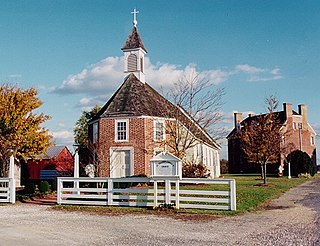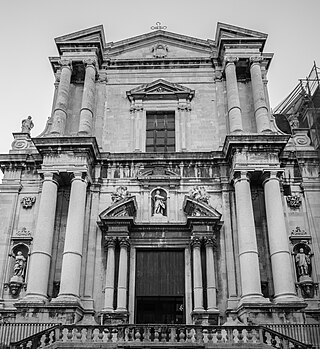
Francis Xavier, SJ, venerated as Saint Francis Xavier, was a Spanish Navarrese Catholic missionary and saint who was a co-founder of the Society of Jesus.

The Church of Saint Andrew on the Quirinal is a Roman Catholic titular church in Rome, Italy, built for the Jesuit seminary on the Quirinal Hill.

Francesco de Geronimo, also Francis Jerome was an Italian Roman Catholic priest and a professed member of the Jesuits. He was an energetic pastor who dedicated himself to missions across Naples either in large locations or in rural areas where he was known for succinct and concise preaching that resonated with all people regardless of their social status. But from his love for the missions came a desire to be in the Far East for missions; he was pained when he was not allowed to join the Jesuit mission in Japan or India but continued to dedicate himself to preaching and teaching students. He is known to have written the "Diu vi Salvi Regina" which later was adopted as the national anthem of an independent Corsica in 1735.

The 26 Martyrs of Japan were a group of Catholics who were executed by crucifixion on February 5, 1597, in Nagasaki, Japan. Their martyrdom is especially significant in the history of the Catholic Church in Japan.

Gesù Nuovo is the name of a church and a square in Naples, Italy. They are located just outside the western boundary of the historic center of the city. To the southeast of the spire, one can see a block away the Fountain of Monteoliveto and the piazza of the church of Sant'Anna dei Lombardi. The square is a result of the expansion of the city to the west beginning in the early 16th century under the rule of Spanish viceroy Pedro Alvarez de Toledo. The square of Gesù Nuovo contains three prominent landmarks:

San Francesco di Paola is a prominent church located to the west in Piazza del Plebiscito, the main square of Naples, Italy.

St. Francis Xavier Church is a Catholic parish located at 611 Sycamore Street, Cincinnati, Ohio. This was the location of the first diocesan cathedral and the center of early Catholic life in the city. It was dedicated to St. Peter on December 17, 1826.

Prince Francis of the Two Sicilies, Count of Trapani was a member of the House of Bourbon-Two Sicilies.

St. Francis Xavier Church and Newtown Manor House Historic District is the first county-designated historic district in Saint Mary's County, the "Mother County" of Maryland and is located in Compton, Maryland, near the county seat of Leonardtown. The district marks a location and site important in the 17th-century ecclesiastical history of Maryland, as an example of a self-contained Jesuit community made self-supporting by the surrounding 700-acre (2.8 km2) farm. The two principal historic structures were added to the National Register of Historic Places in 1972. Archaeological remains associated with the site date back to the early colonial period, mid-17th century.

Pontifical Roman Athenaeum S. Apollinare is a former pontifical university in Rome, named after St. Apollinaris of Ravenna. Its facilities are now occupied by the Pontifical University of the Holy Cross.

The church of San Isidro el Real, also known as the colegiata or collegiate church of San Isidore, is a Baroque building in the centre of Madrid, Spain. It is named after and holds the remains of the patron saint of Madrid, Isidore the Laborer, and his wife Santa María de la Cabeza. It has held the status of a Basilica church for centuries.

San Bartolomeo is a Baroque church in Modena.

The Church of the Nunziatella is a Baroque-style church located inside the grounds of the military school of Nunziatella, in the quartiere of San Ferdinando in Naples, Italy.

San Giacomo degli Spagnoli is a basilica church in Piazza Municipio in central Naples, Italy. The Renaissance church was enveloped in 1812 by the Palazzo San Giacomo built by King Ferdinand I of Bourbon when he built a central block of offices for the ministries of his government adjacent to the fortress of the Castel Nuovo. The Palazzo San Giacomo is now the municipio or city hall of Naples. Another church of San Giacomo degli Spagnoli is found in Rome.

St. Francis Xavier College Church is a Catholic church in the Midtown neighborhood of St. Louis, Missouri, United States. The church was built by the Society of Jesus in 1836: the current building dates from 1884. It serves as a parish church in the Archdiocese of St. Louis and for the Saint Louis University community. It is a contributing property in the Midtown Historic District on the National Register of Historic Places and it is listed as a City Landmark in St. Louis.

The San Pedro Apostol Parish Church, also known as the Diocesan Shrine of Our Lady of Guadalupe in Extremadura and commonly as Loboc Church, is a Roman Catholic church in the municipality of Loboc, Bohol, Philippines, within the jurisdiction of the Roman Catholic Diocese of Tagbilaran.
San Pietro is a Roman Catholic church in central Piacenza, Emilia Romagna, Italy. The church was built over the site of an ancient church titled San Pietro in Foro.

The Church of Saint Francis Xavier is a Baroque church of Palermo. It is located on the Street of the same name in the quarter of the Albergaria, within the historic centre of Palermo. The building is considered the masterpiece of the Jesuit architect Angelo Italia.

San Francesco Borgia is a Roman Catholic church located on Via Crociferi #7, adjacent to the former Collegio Gesuita, and parallel to San Benedetto, and about a block south on Crociferi of the church and convent of San Giuliano, in the city of Catania, region of Sicily, southern Italy. The church is mainly used for exhibits, but still holds much of the original Jesuit artwork.





















